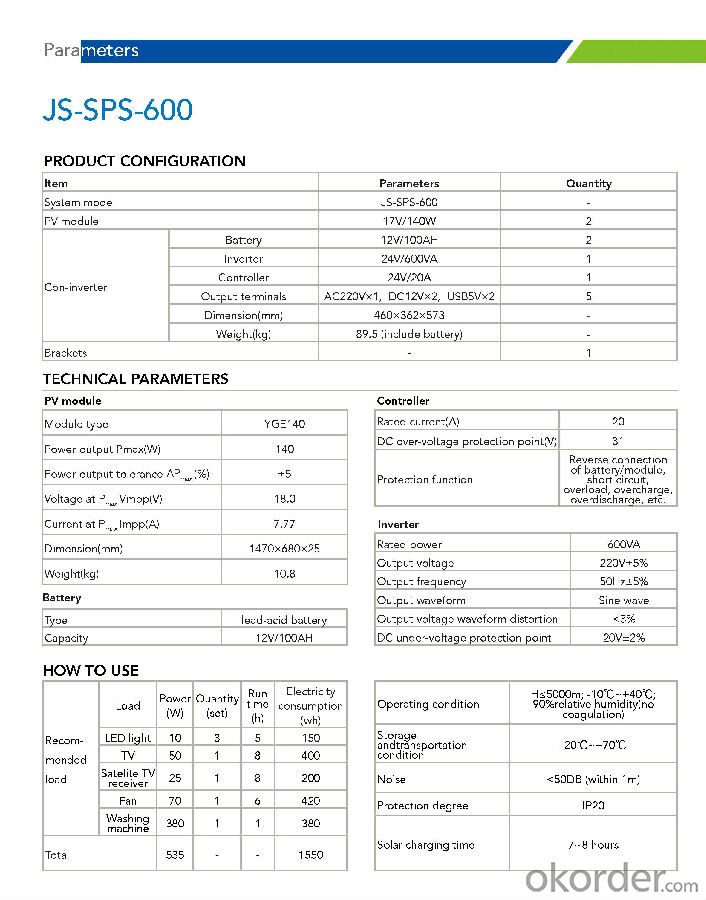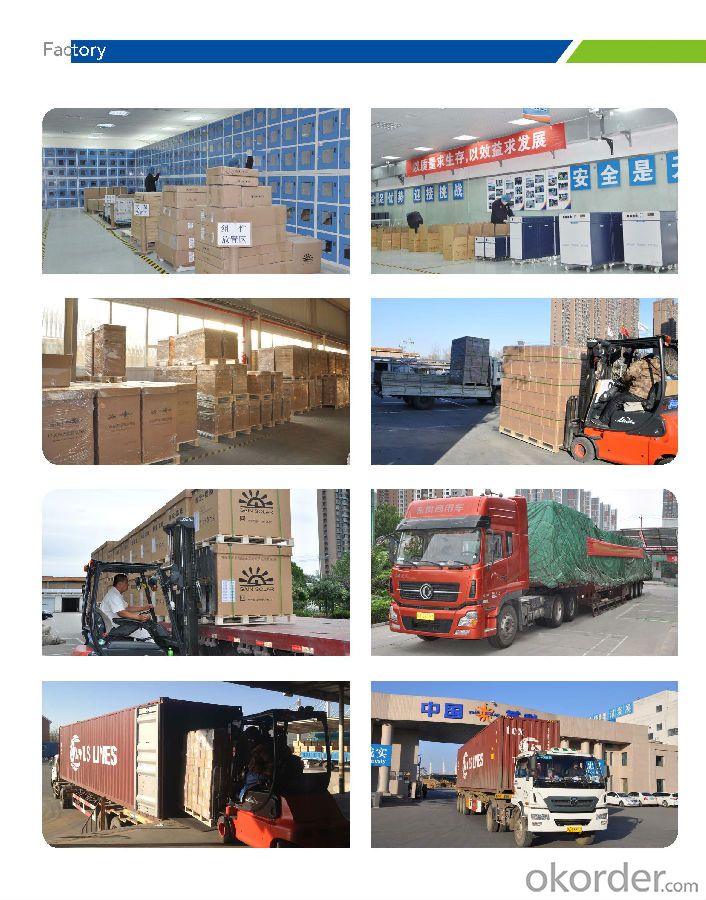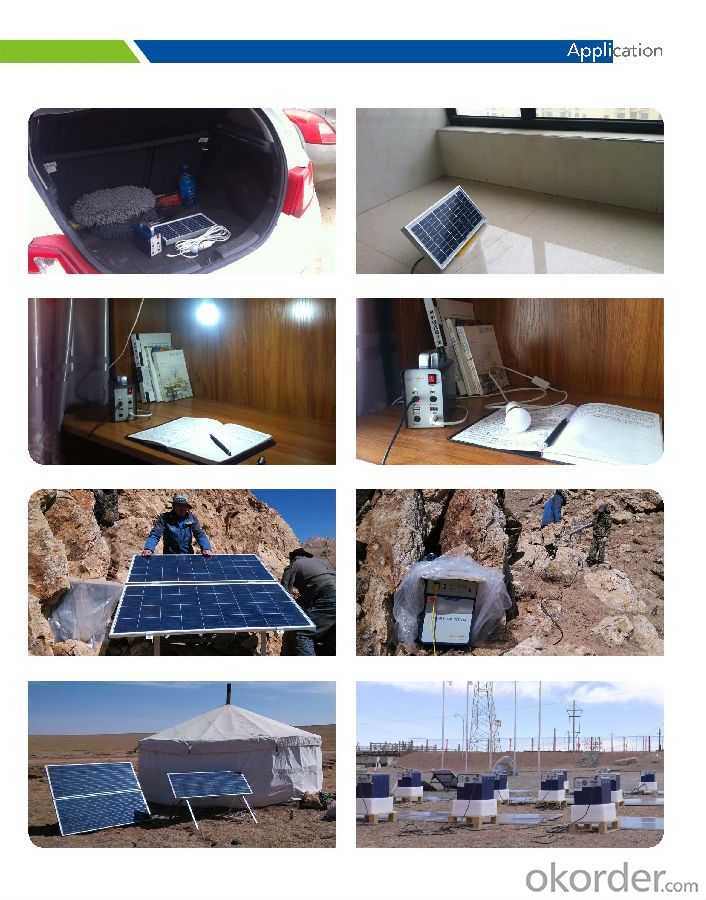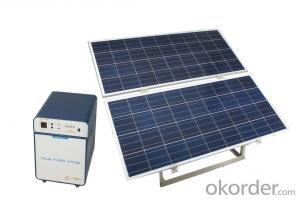Off-grid Solar Power System JS-SPS-600
- Loading Port:
- Tianjin
- Payment Terms:
- TT OR LC
- Min Order Qty:
- 10 set
- Supply Capability:
- 10000 set/month
OKorder Service Pledge
OKorder Financial Service
You Might Also Like
General Introduction
Solar power system provides alternating current and direct current, which is produced by the modules transforming solar power into power, to home lighting, household appliance and other DC appliance, such as cell phone and laptop.
Solar power system is widely used in area lack of power, for example house power supplying, monitoring, communication base, fire prevention in forest area, pasture and meadow, aquaculture etc.
We are dedicated to provide high quality off-grid PV products and systems to customers and has received a series of certificate, including ISO9001, TUV, UL, CE, CQC and RoHS.
Off-grid Solar Power System
High efficent PV module can produce more power.
Sine wave output is suitable for all kinds of load. Varieties of DC output, let it more
convenient for users.
The multifunction design make it easy to operation and maintenance.



- Q:Can solar panels be integrated into building materials like windows or roofing tiles?
- Yes, solar panels can be integrated into building materials like windows or roofing tiles. These types of solar panels are known as building-integrated photovoltaics (BIPV). BIPV technology allows for the seamless integration of solar panels into various building materials, providing both energy generation and architectural functionality. This integration helps maximize space utilization and promotes sustainable energy generation within the built environment.
- Q:Can solar energy systems be used for powering amusement parks?
- Yes, solar energy systems can definitely be used for powering amusement parks. With the advancements in solar technology and the ability to harness and store solar energy, amusement parks can install solar panels to generate electricity and meet their power requirements. Solar energy systems can be integrated into the park's infrastructure, such as on rooftops, parking lots, or open spaces, to provide clean and sustainable energy for rides, lighting, and other operational needs. Additionally, solar power can help reduce carbon emissions and operating costs, making it an environmentally friendly and economically viable solution for powering amusement parks.
- Q:Can solar energy systems be integrated into building design?
- Yes, solar energy systems can definitely be integrated into building design. In fact, solar panels and other solar technologies are commonly incorporated into the design and construction of modern buildings. This integration allows for the generation of clean and renewable energy on-site and reduces dependence on traditional energy sources. Additionally, integrating solar energy systems into building design can help reduce greenhouse gas emissions and contribute to a more sustainable and environmentally friendly future.
- Q:Can solar energy systems be used in powering schools or educational institutions?
- Certainly, solar energy systems are a viable option for powering schools and educational institutions. By installing solar panels on the rooftops of these establishments, they can generate electricity that is both clean and renewable. This reduces their dependence on traditional fossil fuels, resulting in numerous advantages. Not only does it decrease greenhouse gas emissions and combat climate change, but it also leads to long-term cost savings on energy bills. Additionally, educational institutions have the opportunity to set an example for sustainable practices by employing solar energy and educating students about the significance of renewable power sources. Furthermore, solar power systems can be incorporated into the curriculum, allowing students to gain practical knowledge about solar energy and its real-world applications. All in all, integrating solar energy systems into schools and educational institutions presents a multitude of benefits, including environmental sustainability and educational opportunities.
- Q:Are there any government incentives or rebates for installing solar energy systems?
- Yes, there are government incentives and rebates available for installing solar energy systems. These incentives vary by country and region, but they often include tax credits, grants, and rebates to help offset the initial costs of installation. Additionally, some governments offer feed-in tariffs, which allow solar energy system owners to sell excess electricity back to the grid at a premium rate. It is advisable to check with local government agencies or consult with a professional to understand the specific incentives available in your area.
- Q:Can solar energy systems be installed on any type of building?
- Yes, solar energy systems can be installed on any type of building, as long as there is sufficient sunlight available for the system to function effectively. Whether it's a residential house, commercial building, or even an industrial facility, solar panels can be installed on rooftops, facades, or even as standalone structures such as solar carports or ground-mounted systems. The only requirement is that the building or site should have a suitable area for installing the solar panels and receive enough direct sunlight throughout the day. Additionally, it is important to consider structural integrity, orientation, and shading factors to optimize the performance of the solar energy system. With advancements in solar technology and flexible installation options, solar energy systems can be easily adapted to fit any type of building or structure.
- Q:Can solar energy systems be used in powering retirement homes or assisted living facilities?
- Yes, solar energy systems can certainly be used to power retirement homes or assisted living facilities. In fact, solar energy can be a highly beneficial and cost-effective solution for these types of facilities. Retirement homes and assisted living facilities have a high energy demand due to the need for heating, cooling, lighting, and various electrical appliances. By installing solar panels on the rooftops or in suitable areas, these facilities can generate their own electricity and reduce their reliance on the grid. Solar energy systems can help these facilities reduce their operating costs significantly, as they can offset a considerable portion of their electricity bills. This is especially important for retirement homes and assisted living facilities, as they often operate on tight budgets and need to allocate resources efficiently. By harnessing solar power, these facilities can redirect the saved funds towards providing better care and services for their residents. Furthermore, solar energy systems contribute to a cleaner and greener environment. Retirement homes and assisted living facilities have a responsibility towards their residents' well-being, and by using solar power, they can reduce their carbon footprint and promote sustainability. This can have a positive impact on the health and overall quality of life for the residents. Additionally, solar energy systems can provide a reliable source of power during emergencies or power outages. Particularly in areas prone to extreme weather events, where power disruptions are more common, having a solar energy system with battery storage can ensure continuous and uninterrupted power supply to critical areas such as medical equipment, lighting, and HVAC systems. In conclusion, solar energy systems are a viable and beneficial option for powering retirement homes or assisted living facilities. They can significantly reduce operating costs, promote sustainability, and provide a reliable source of power, ultimately improving the quality of care and services provided to residents.
- Q:What is the impact of roof age on the performance of solar panels?
- The age of a roof can impact the performance of solar panels in several ways. Firstly, an older roof may have structural issues or damage that could affect the installation of solar panels. Additionally, an aging roof may have worn or deteriorated shingles, which could lead to leaks or water damage that can harm the solar panel system. Moreover, an older roof may not have been designed to accommodate the weight of solar panels, potentially leading to structural instability. Therefore, it is essential to assess the condition and age of the roof before installing solar panels to ensure optimal performance and longevity of the system.
- Q:Can solar energy systems be used in areas with high levels of seismic activity?
- Yes, solar energy systems can be used in areas with high levels of seismic activity. However, it is important to design and install these systems with proper engineering considerations and precautions to withstand potential earthquakes. By implementing robust mounting structures, flexible connections, and secure anchoring systems, solar panels can be made resilient to seismic forces. Additionally, regular inspections and maintenance should be carried out to ensure the integrity and safety of the solar energy systems in earthquake-prone areas.
- Q:How does the efficiency of solar panels affect a solar energy system?
- The efficiency of solar panels directly impacts the overall performance and cost-effectiveness of a solar energy system. Higher efficiency panels can generate more electricity from the same amount of sunlight, allowing the system to produce more power. This can result in a higher return on investment and shorter payback periods. Additionally, more efficient panels require less space, making them suitable for installations where space is limited. Conversely, lower efficiency panels may require more space and installation costs to achieve the desired energy output. Therefore, the efficiency of solar panels plays a crucial role in optimizing the performance and economic viability of a solar energy system.
1. Manufacturer Overview |
|
|---|---|
| Location | |
| Year Established | |
| Annual Output Value | |
| Main Markets | |
| Company Certifications | |
2. Manufacturer Certificates |
|
|---|---|
| a) Certification Name | |
| Range | |
| Reference | |
| Validity Period | |
3. Manufacturer Capability |
|
|---|---|
| a)Trade Capacity | |
| Nearest Port | |
| Export Percentage | |
| No.of Employees in Trade Department | |
| Language Spoken: | |
| b)Factory Information | |
| Factory Size: | |
| No. of Production Lines | |
| Contract Manufacturing | |
| Product Price Range | |
Send your message to us
Off-grid Solar Power System JS-SPS-600
- Loading Port:
- Tianjin
- Payment Terms:
- TT OR LC
- Min Order Qty:
- 10 set
- Supply Capability:
- 10000 set/month
OKorder Service Pledge
OKorder Financial Service
Similar products
New products
Hot products
Hot Searches
Related keywords






























